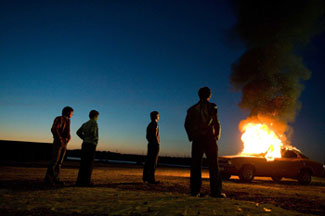
Directed by Oliver Hirschbiegel
Starring: Liam Neeson, James Nesbitt, Anamaria Marinca
Five Minutes of Heaven, which was shown at the Sarajevo Film Festival, focuses on themes familiar to the countries of this region. Bosnian people can definitely relate to a story of reconciliation between two individuals on opposite sides. This film deals with harsh, dark emotions, depicting the true nature of humanity.
One of the film’s actors, James Nesbitt, along with screenwriter Guy Hilbert and director Oliver Hirschbiegel, spent a couple days at the Sarajevo Film Festival.
Five Minutes of Heaven is based on a true story: In October 1975, in a small town in Northern Ireland, a young Protestant, Alistair Little, shot and killed Jim Griffin, a Catholic. Little went to jail for 12 years for his crime, making a new commitment to bring peace among the youth who were being seduced by terrorists in Northern Ireland. He, however, would never meet Joe Griffin, the young brother who witnessed the killing.
The film questions what might have happened if the two men had met and discussed their feelings about the murder. In the movie, they are asked to shake hands in front of the cameras for a television program, with hopes that could bring about reconciliation. Liam Neeson and James Nesbitt are superb as Little and Griffin.
Five Minutes of Heaven was directed by Oliver Hirschbiegel, the German filmmaker who envisioned Hitler’s bunker in the film Downfall. He exercises similar techniques here, mixing the real with the imaginary. Hirschbiegel’s film benefits from the clever screenwriter Guy Hibbert, as well as from close collaboration with the real Griffin and Little. The film is the portrait of a process: the hatred and the trauma that served as a foundation for the violence, taking years and years to process and treat.
Hibbert talked about the filmmaking process: “There really was a television show which tried to bring together a Protestant from Northern Island, today a civil activist, and the brother of his victim. The script-writing process was long, because the only two people who could change it were these men. They however, have never met in real life. Yet, I felt a moral obligation to create a fictional possibility of such an event. That was difficult, because we spent four weeks negotiating the last four sentences in the film with the two of them.”
In real life, Joe Griffin (the brother of victim) and Alistair Little (the killer) have never seen each other again. Griffin attended the premier of the film in Belfast and Little in Dublin. “I asked them what would happen if they meet. Joe said he would pull a knife, and Alistair said he would try not to defend himself, ” said Hibbert.
Part of this brilliant film’s success may arise from the fact that it was directed by a foreigner, an outsider, who could be entirely objective. The film does not take sides: here, the killer and the victim are both heroes. It’s a responsible drama that aims, through creative consultation, to capture something of Northern Ireland and its history. The drama challenges viewers to think about the legacy of our past.
Rating: **** (4 out of 4 stars)
Disclosure: The author received a complimentary ticket to view this movie as a member of the press.

